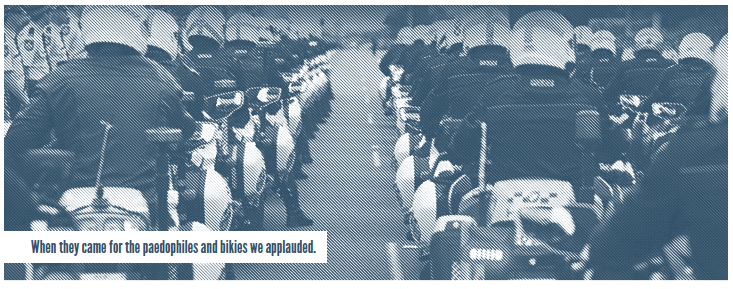Bond University’s Professor of Criminology, Paul Wilson, has warned the Queensland Government against imposing tough new laws on biker groups.
The warning follows the Queensland cabinet’s decision to approve the preparation of new laws based on South Australia’s and New South Wales’ anti-biker legislation, which came as a result of last month’s bikie gang-related violence in Sydney. Among the possible new laws, police would be given the power to apply to the Queensland Supreme Court for an order that would ban members identified in outlawed motorcycle gangs from associating with each other.
Alarmingly, as in South Australia and New South Wales, these laws might also lower the criminal burden of proof on bikie gang-related crimes from ‘beyond a reasonable doubt’ to ‘on the balance of probabilities’.
“The introduction of draconian laws governing demographic groups is a breach of civil liberties and an infringement on the right of all Queenslanders to live in a democratic society,†said Professor Wilson.
“The Queensland Government’s proposal to impose tough legislation on bikies sets a dangerous precedent. It opens up the potential for government to arbitrarily apply these criminal ‘association’ laws to any political opponents or religious groups to whom it takes a dislike,†continued Professor Wilson.
In a submission given to the Queensland Government, Professor Wilson draws relevant comparisons to Canada, Scandinavia and the United States, where laws targeting groups rather than individuals have failed to significantly reduce crime rates, particularly in outlawed motorcycle groups.
“International evidence indicates that laws which criminalise groups as a whole, such as bikies, increase the probability of more public violence from these groups,†Professor Wilson continued.
In Canada, laws that banned outlaw motorcycle gangs and clubs led to the institution of the state coming under attack in 1997 and 1998. During a series of riots in Quebec, two prison officers and an innocent bystander were killed, two persons who were believed to be prison officers were seriously injured by automatic pistol fire, and seven bombs were placed under police stations.
According to Quebec’s Minister for Public Works and Government Services, there have been 85 murders and 92 attempted murders related to Quebec’s biker wars since 1992, together with 129 arson attacks and 82 bombings. According to Professor Wilson, these figures indicate the ineffectiveness of legislative measures to control outlaw motorcycle gang-related crime which, by the admission of the Royal Canadian Mounted Police, indicate no change in crime rates post implementation of related legislation. The Hells Angels Quebec, and similar groups in other provinces, were later jailed in 1998 and yet they remained ‘Organised Crime – Enemy Number 1’ throughout Canada through to March 2009.
“There is no domestic or international evidence which indicates that the relevant Canadian legislation the Queensland Government may model itself on, such as the C-95 bill passed in 1997 and more recently, the C-25 bill passed in 2006, will diminished violent gang-related activity or organised crime,†said the Professor.
In Australia, recent figures issued by the Law Enforcement Assistance Program (LEAP) reveal that gang-related violence, including violence generated by street, ethnic and biker groups, represents just 0.6 per cent of all crime, with biker gang-related violence only amounting to 0.3 per cent of crime in total.
Professor Wilson continued: “In deciding how to deal with any type of organised crime, including biker crime, modern democratic governments should not be persuaded by political propaganda or lobbying by interest groups, but rather, by evidence-based research and best practice.â€
“Rigorous investigation of individual offenders and effective crime-prevention schemes should be encouraged.
“There is no evidence that supports the effectiveness of tougher laws targeting groups rather than individual criminals,†concluded Professor Wilson.
Â


